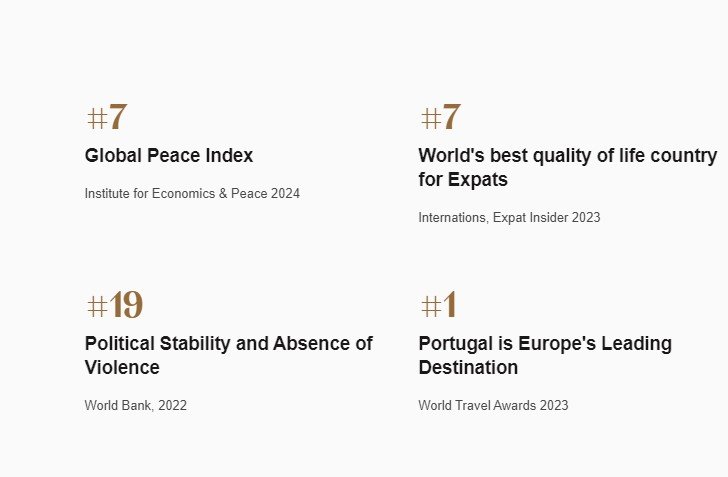A question most people ask is this – is moving to Portugal a good idea? Often, you may wonder about the quality of life to look forward to. If you ever look at a map of Portugal, you’ll see that it boasts astonishing beaches, an affluent history, and a hospitable culture that has attracted individuals from around the world. However, while Portugal offers many other things that can attract you. Still, deciding to move to Portugal is a big one. Here we will talk about all the things that you can look forward to if you decide to take the plunge.
Is Moving to Portugal a good idea?
Portugal is an attractive country for to immigrants find a better quality of life. Here you can look forward to 300 days of sunshine, a temperate climate, great safety, and an environment that focuses on balancing work and a good life.
Besides, when compared to other European countries, living in Portugal is cheaper. This is a big plus for those longing to extend their budget further. In Portugal, you will surely experience their rich culture, and their exotic landscapes are unforgettable.
Another interesting part are the irresistible tax incentives, specifically for expats like you. The notable ones are the Golden Visa and the Non-Habitual Resident status, which can provide huge financial benefits.

Dynamics To Consider
Yes, Portugal is amazing. But you need to consider also all the downsides of moving there. First, the economic system isn’t fast-paced, and the cost of living is pretty low. This means salaries aren’t as attractive as in many other Western countries. For instance, the minimum wage in Portugal is about $1,000. This means the country could be considered affordable, but compared to countries like America the salaries aren’t that attractive. Nevertheless, here are other challenges you must prepare for:
Weather variations
Portugal does have a pleasant climate. But you should note that the weather in one end of Portugal isn’t the same in the other. Plus Northern Portugal and inland areas often have super cold winters. Depending on where you are coming from, you might need heating in your apartment or home.
However, heating units don’t come with a lot of lower-end apartments. You may consider renting or purchasing a portable unit. Additionally, summers can be a scorching lot with temperatures reaching 40ºC (100ºF) inland. This is why the locals and tourists often visit places like the Algarve during summer. Here they can look forward to the ocean breeze combating the hot summers.
Culture shock and bureaucracy
Getting your footing in the Portuguese administrative system can be time-consuming and frustrating, requiring you to exercise a lot of patience and persistence. Also, since you are coming from a different social/cultural background, fitting into Portuguese culture and building a formidable social circle might be challenging. Consider looking for literature about the Portuguese local customs and language. That can help you know what to expect about the country.

Visa requirements and residency permits
Portugal offers several visa options. The choice is yours on the visa option you want, or the visa option that fits your purpose of moving. Below are the most common ones for ex-pats you can select from:
- D7 Visa (Passive Income Visa): It Is great for digital nomads, retirees, and people with rental income. If you go for the D7 visa, you will need to show proof of sufficient passive income that can sustain you in Portugal. Besides, with it, you can live and work in Portugal.
- Golden Visa: This is an investment-based visa, which demands you to have significant investment in business or creating jobs, and real estate. The good thing about this visa is that it enables you to get your residency and citizenship faster than most other visas.
- Digital Nomad Visa: This is a unique visa meant for people who work remotely. However, as a remote worker you will need to show proof of remote employment and a minimum income. Though, you can only stay in Portugal with it for just a year. Fortunately, it is renewable for up to five years.
- Other Visa Options: Apart from these visa options listed above, you can try other visa options such as work visas, school visas, and family reunion visas.
Now, after getting your visa and you have stayed in Portugal for some time, you can then apply for a residency permit. This will give you leverage to remain in the country for an extended period. That said before you decide on the visa that works consult an immigration lawyer who will guide you throughout the process. They can help you get the documents ready. Don’t forget to include documents like your health insurance, proof of income, and accommodation. Though not compulsory, proficiency in the Portuguese language could accelerate integration.
Finding accommodation
As an immigrant, getting an accommodation is very important. It is either you rent a house or buy a house. Renting a house gives you the flexibility to move from one apartment to another. This gives you time to find an apartment and area that suits you. Besides, you don’t have to pay any down payments or closing costs, and you won’t be paying maintenance fees since your landlord will be handling that.
Buying a house gives you stability and a sense of firmness and control over the place you reside. Besides, certain tax benefits come with owning a house in Portugal. Your property could also be a futuristic investment with great chances of appreciation.
However, buying a house means you will have to make a down payment, pay closing costs, and get prepared for potential renovation expenses. As a landlord, you will pay for maintenance costs, property taxes, and utility bills.
Well, renting or buying a house in Portugal depends on individual circumstances, financial goals, and lifestyle preferences.
Healthcare options
Portugal has a high-level of healthcare system and spends almost 10% of their GDP on healthcare annually. Healthcare in Public hospitals is free for all citizens and legal immigrants. You also have the option of private hospitals, which are very efficient, especially for faster responses. However, private hospitals are not free. Besides, you can get a good private healthcare insurance policy that can suit your situation, at affordable prices. Generally, healthcare is relatively cheaper in Portugal compared to several European countries.

Educational system
Portugal has an incredible educational system. Apart from offering you top-quality education, you also have options to select from the variety of schools and universities in Portugal. Graduates from universities in Portugal can also be employed in any European country since Portugal is among the countries that make up the European Union (EU).
Public schools in Portugal are free for citizens, and as a legal resident, you can enroll your children in Portuguese public or private schools. It is good you note that private schools are not free. The European Bologna System is applied in the higher education system of Portugal. Besides, getting a quality education in Portugal is very cheap when compared to most European countries. Interestingly, their university courses are being taught in English and Portuguese.
There are over 50 international schools spread around various cities in Portugal. So, as an expat, you don’t need to worry much about which international school you want your children to attend. Because there are so many reputable international schools for you to select from. Places like Porto, Lisbon, and the Algarve have a higher concentration of these international schools.
The schools often get accreditations from respected international organizations. The environment in these schools is multicultural since children from different backgrounds get to interact with each other. Besides, children are taught to respect other cultures that are different from theirs and to be open and flexible in their dealings with people. There is just so much to learn.
Conclusion
So is moving to Portugal a good idea? Portugal presents a charming mix of top quality of life, low cost of living, and rich culture. Beautiful climate, hospitable people, and mellow pace of life have caught the attention of many expats. However, before you make the great move to Portugal, it is good you carefully consider other factors. Among the notable factors you should consider are the job market, cost of living, language proficiency, and visa requirements. It is good you carry out proper research about them. It is understandable how irresistible the allure of living in Portugal may seem, but is important to measure the potential challenges and opportunities before relocating.
As a potential expat, making a sound decision is vital. And to do that you have to carry out in-depth research, explore various regions, and consider consulting with other expats or immigration experts.
Frequently Asked Questions about Moving to Portugal?
How much money do you need to live comfortably in Portugal?
As a single person, you can live with Portugal for between $1000 to $1,500 a month (aside from rent). Couples require up to $3,000. That said, the lifestyle you want, whether you’ll be eating out a lot, visiting the cinemas, attending festivals, or going on guided tours, will heavily influence your budget.
What is the best country to move to from the US?
Determining the best country to move to from the US depends heavily on your personal preferences, lifestyle, and financial situation. However, Portugal is often considered a top choice due to its high quality of life, affordable cost of living, and welcoming atmosphere. Other popular options include Spain, Canada, and Costa Rica
Is it easy to get a job in Portugal?
Finding a job in Portugal can be challenging, especially for foreigners without Portuguese language skills. The job market is competitive. That said, there are always opportunities in the tourism, tech, and renewable energy sectors. You’ll need to scout job boards patiently, prepare your resume, and network with expats in the country to get a decent job. Overall, securing employment might require perseverance.
Can you live on $1000 a month in Portugal?
It’s possible to live on $1000 a month in Portugal, but it would require a frugal lifestyle and likely living outside major cities. For example, some rural areas in Portugal have apartments going for about $400. So, it’s possible. But this budget might be tight for covering rent, utilities, food, and transportation.
Does Portugal have free healthcare?
Portugal has a public healthcare system, but it’s not entirely free. Residents contribute to the system through taxes, and there are co-payments for certain services. For expats, healthcare coverage can be obtained through private insurance or by applying for a Portuguese residency permit.
Can you live in Portugal for $2,000 a month?
Yes, you can live comfortably in Portugal for $2,000 a month. This budget allows for a decent standard of living, including rent, food, transportation, and leisure activities. Still, this budget is low, if your target is city centers like Lisbon and Porto. Most apartments in Lisbon and Porto cost as much as $1,000 to $1,500.
Can an American buy a house in Portugal?
Yes, Americans can buy houses in Portugal. You can buy one as a foreigner or as a part of the Golden visa program which can help you get a residency permit. Consult, an immigration lawyer to help you with the process especially complying with local property laws.
Can a US citizen live permanently in Portugal?
Yes, US citizens can live permanently in Portugal. There are several visa options available, including the D7 visa for independent financial means and the Golden Visa for real estate investment.






